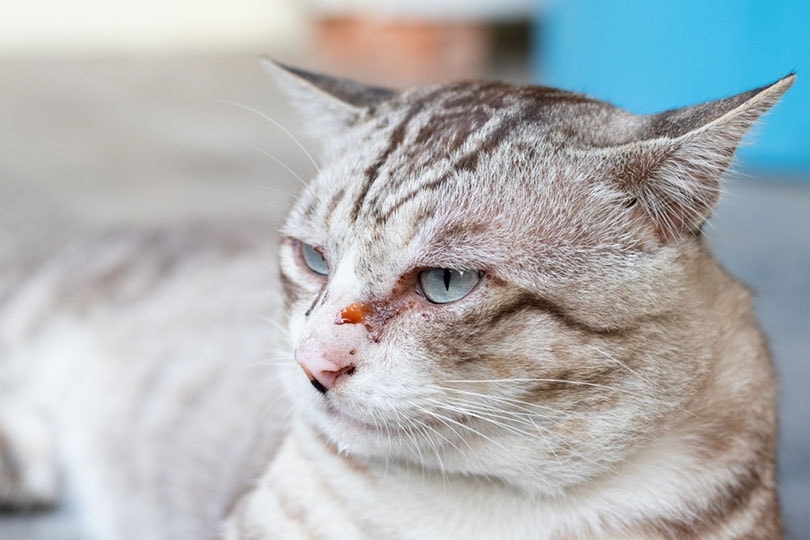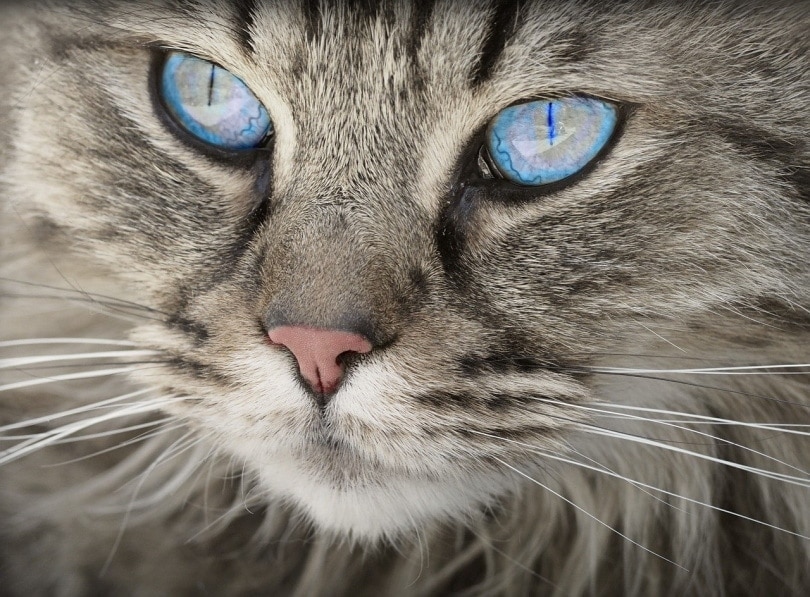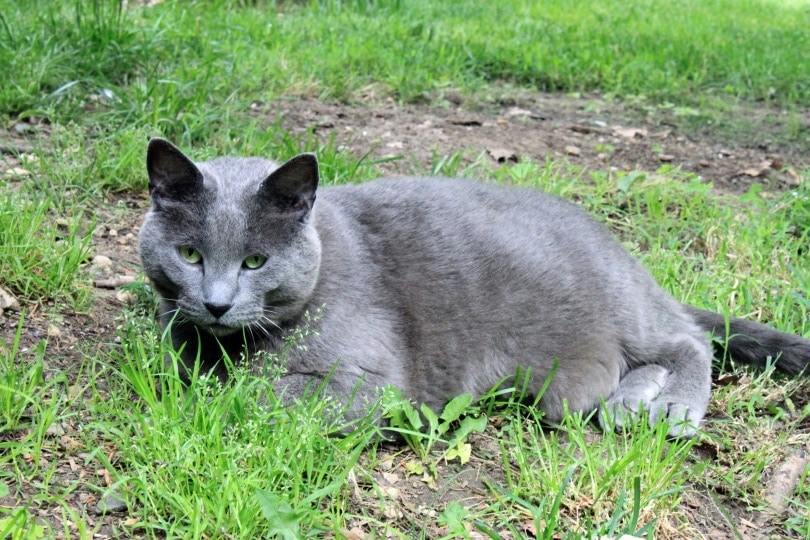Why Do Cats Bite Then Lick? 6 Possible Reasons
Updated on
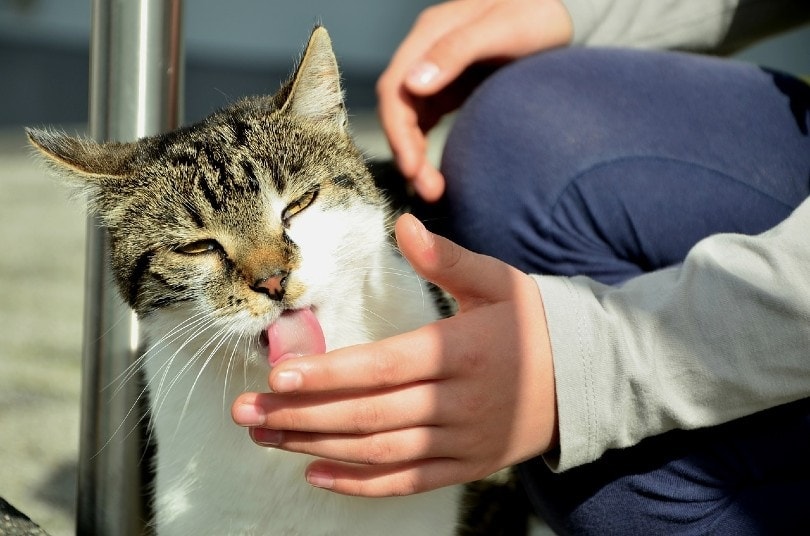
If you own a cat, you may have noticed a strange behavior: your cat may bite you, only to lick you immediately afterward! To most people, licking and biting are two completely different things. A biting cat is typically an angry cat, while a licking one is a happy cat. So, what does it mean when your cat does both?
While this behavior can seem a bit strange to us, there are several ways that this behavior can make complete sense to our cats. Keep reading to find out the potential reasons behind this behavior.
The 6 Main Reasons Cats Bite Then Lick
1. Grooming
If you’ve ever watched a cat groom themselves, you’ll likely notice that they tend to bite their fur a bit too. Just like us, cats get things stuck in their fur. Whether it’s tangles or foreign material, cats may bite to help get these snags out of their fur. In fact, most cats bite their fur a few times and then lick to lay their fur down.
When cats are being affectionate towards us, they may mirror these grooming behaviors, as when cats are affectionate towards each other, they usually groom each other too. That’s how they show affection and mix their scents together.
So, when cats are being affectionate toward people, these grooming behaviors tend to come out, and cats will bite our “fur” and then lick us shortly afterward. That’s how they groom themselves, so they assume that’s how we need to be groomed too!
Of course, we don’t have fur and, therefore, don’t need to bite any tangles out. Our cats may not understand this though, and to them, we’re just big cats!
2. They’re Being EXTRA Lovable
Even if your cat doesn’t usually bite you while participating in “grooming,” they may still perform this behavior in certain circumstances. For instance, studies have shown that cats are a bit more interactive and affectionate with their owners after they have been separated. Therefore, they may be a bit more forceful in their affection, which may include biting.
If you’ve been gone for a few days only to come home to a biting cat, it may not necessarily mean that they’re mad at you. Instead, they could just be being extra lovable!
It’s the difference between a regular hug and a bear hug.
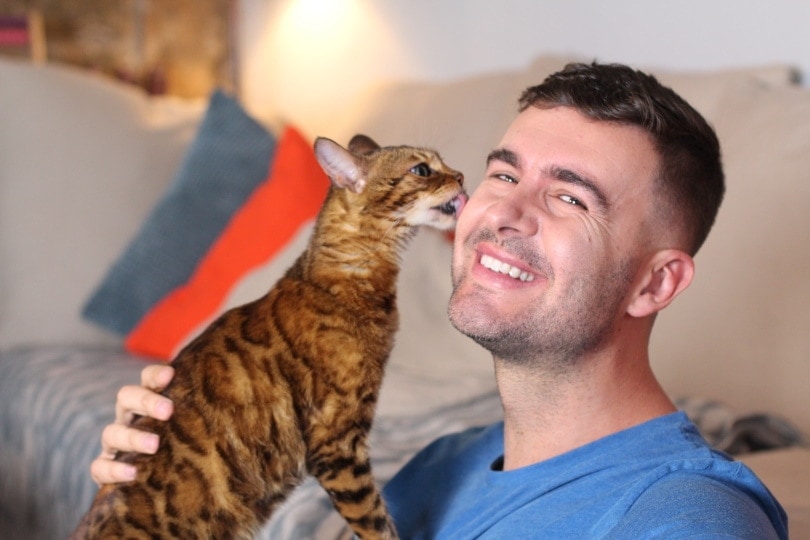
3. Play
Many cats bite when they play but they may also lick, especially if they’re being gentle. If your cat is exhibiting other playful signs (like pouncing behaviors or swishing its tail), it could be a sign that they’re just trying to play with you.
Of course, we don’t necessarily want to teach our felines that it’s okay to bite in this situation and you should preferably redirect them to something else. Cat toys are extremely useful in this situation.
By continuously redirecting your cat to a toy instead of your hand, you teach them what is okay to play with and what isn’t. Eventually, they should skip biting your hand and go straight to the toy.
The best toys will give your cat hours and hours of exercise and entertainment. Our Hepper Catnip Stick Toys are packed with 100% organic catnip and shaped like prey to give your cat both mental and physical stimulation. Plus, they're as nice to look at as they are sturdy and fun!
4. Pain
Just like people, cats can be quite grumpy when they’re in pain and may be more prone to biting, but they may follow up these bites with licks.
On the one hand, cats may bite you when you touch the tender spot. They may stop enjoying being petted or groomed as it may be painful for them. On the other hand, cats also tend to groom more when they are sick. Grooming produces oxytocin in cats, which is a natural painkiller. In other words, grooming literally makes cats feel better. Therefore, they may also lick you more than normal in an attempt to make themselves feel better. Either way, both licking and biting are closely associated with sickness.
With that said, cats are typically very good at hiding their injuries and sickness. This behavior comes from the days when the cat used to be in the wild. If the cat acted sick, they would often be seen as easy prey and attacked, and so they need to be good at hiding their pain.
Often, the only symptoms you get are strange behaviors like the one we’re discussing in this article. That’s why if you notice anything strange about your cat it’s typically in your best interests to see a vet right away.
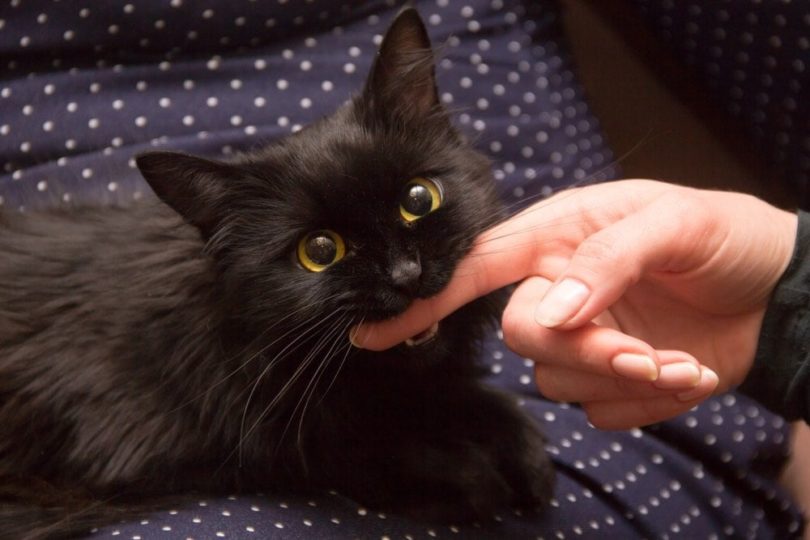
5. Warning
Some cats may bite and lick when they are upset and usually, and this is a sign that your cat does not want to be touched. Sometimes, this can be due to pain or illness, as we have previously discussed, or it can also be caused by other issues. Sometimes, a cat just doesn’t want to be petted!
Either way, biting is usually considered a warning. While the lick afterward may cause some confusion, if your cat is acting angry, they probably are.
As always, you’ll need to look at your cat’s other body language to figure out whether they’re angry or just in pain.
6. Seeking Attention
Cats are extremely smart animals. They will figure out what gets your attention and what doesn’t pretty quickly. If you have previously shown your cat attention after they bit and licked you, then they may continue these behaviors for attention.
If your cat does this when they want something like attention or more food, then the behavior is likely attention-seeking. This is rarer than the other reasons we’ve mentioned, as your cat has to learn it first, but still entirely possible.
Final Thoughts
Cats may bite and lick you in quick succession for a variety of reasons. Usually, your best bet is to pay attention to your cat’s other behaviors and body language, which should give you a clue as to why your cat is doing this, to begin with.
If your cat is content and enjoying your attention, they are probably just grooming you. If your cat is angry, then it may be time to stop the petting session. Decreased appetite and activity can point towards a cat that’s in pain, even if they seem to be acting pretty normal otherwise.
Some cats may bite and lick for attention. Usually, in this case, the biting and licking happen as soon as your cat walks up to you, and they probably just want something from you.
While this behavior is typically nothing to worry about, it can be a sign that something is wrong. Therefore, if your cat has suddenly started biting and you can’t discern a cause, we recommend speaking with your vet.
See Also:
- Why Does My Cat Hug My Arm Then Bite Me? 6 Possible Reasons
- Why Does My Cat Bite My Feet? 6 Possible Reasons
Featured Image Credit: congerdesign, Pixabay



